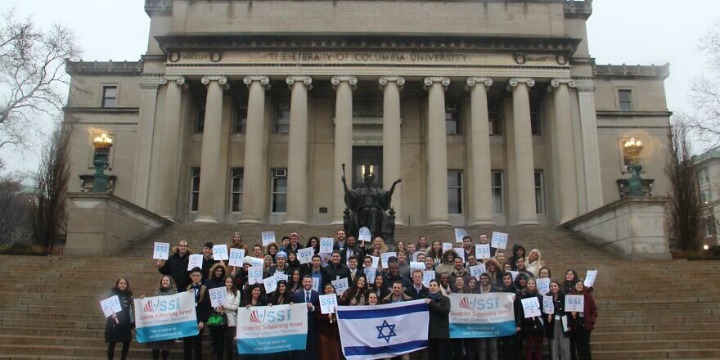Words Aren’t Enough; Action Is Also Needed at Columbia
 by Gerard Filitti
by Gerard Filitti

Pro-Israel students from 30 university campuses across the United States and Canada gathered at Columbia University in New York City for the Students Supporting Israel conference. Photo: Facebook.
In a recent statement on March 6, 2020, Columbia University President Lee Bollinger acknowledged that he has “increasingly become concerned about antisemitism” on the Columbia campus.
He further acknowledged that Jewish students are feeling “hatred and demonization, and invidious discrimination,” stating, “I feel it, and it’s wrong.”
Admitting that there is a problem is an important first step to fixing it, and President Bollinger should be given credit for finally recognizing that Jewish students at Columbia are being subjected to “invidious discrimination.”
However, despite his rhetoric, Bollinger still refuses to acknowledge the full extent of the problem; he claims that “no Jewish student” believes that “Columbia is an ‘antisemitic’ institution with systemic bigotry.” This claim is simply untrue.
The Lawfare Project recently filed a complaint that identifies a pattern of indifference and failure to act by the administration in connection with antisemitism on campus that was identified and expressly reported to university officials.
One stark recent example is the way in which the university handled concerns (addressed to President Bollinger in writing) about a faculty member who gave a speech in November 2019 essentially praising “the armed resistance of the Izz ad-Din al-Qassam Brigades.”
The al-Qassam Brigades comprise the violent armed wing of Hamas, which is designated as a terrorist organization by countries including the United States and Israel, as well as by the European Union. The university did nothing to address these concerns; President Bollinger was silent.
In April 2019, Students for Justice in Palestine (SJP) — the group that has been aggressively demanding divestment from Israeli persons and companies, the same divestment that President Bollinger now opposes — published a statement advocating the boycott of Jewish student groups on campus and the rejection of the civil rights movement of the Jewish people. Given the very public nature of this statement and the nature of what was occurring on campus, the university had an obligation to protect the members of the Jewish and Israeli communities from discrimination and harassment. Yet the administration was silent.
SJP — which has now been sanctioned by the university — is an organization run amok. When it doesn’t publicly shun Jewish students or refuse to acknowledge them, its adherents accost members of the Jewish and Israeli communities, creating a hostile atmosphere that is unbefitting of any academic institution.
In May 2018, a faculty member — who has a history of making antisemitic remarks, including equating Israel with Nazi Germany and ISIS, and accusing Jewish US citizens of having dual loyalties — posted that “every dirty treacherous ugly and pernicious happening in the world just wait for a few days and the ugly name ‘Israel’ will pop up in the atrocities [sic].”
A coalition of over 250 Columbia students, alumni, faculty, and community members sent a letter to the university asking it to publicly condemn such postings and affirm that Jewish students are as welcome as the rest of their peers at Columbia. The university actually responded, citing the professor’s right to “freedom of expression.” Nowhere did the university cite the right of Jewish and Israeli students to be free of discrimination and harassment.
These are but a few examples of antisemitism at Columbia. Taken together, the incidents show that discrimination against the Jewish and Israeli communities at Columbia is hostile, pervasive, and ongoing.
President Bollinger himself admits that Jewish students feel “invidious discrimination.”
President Bollinger has finally spoken, but it is disingenuous of him to say that he has “become concerned about antisemitism” while at the same time not acknowledging his role in ignoring and dismissing the complaints and concerns of the Columbia University community.
Words are not enough — they must now be followed by action.
Gerard Filitti is Senior Counsel at The Lawfare Project, a non-profit legal think tank and litigation fund based in New York City that focuses on matters of civil and human rights, discrimination, antisemitism, and counterterrorism.
A version of this article was originally published by CU Monitor.
 Iran Sentences Rapper Toomaj Salehi to Death Over 2022-23 Unrest
Iran Sentences Rapper Toomaj Salehi to Death Over 2022-23 Unrest Netanyahu: ‘Antisemitic Mobs Have Taken Over Leading U.S. Universities’
Netanyahu: ‘Antisemitic Mobs Have Taken Over Leading U.S. Universities’ U.S. Decides Against Sanctions on IDF’s Netzah Yehuda Battalion
U.S. Decides Against Sanctions on IDF’s Netzah Yehuda Battalion Israel Says It Is Poised to Move on Rafah
Israel Says It Is Poised to Move on Rafah Israeli Hostage Hersh Goldberg-Polin Seen Alive in a New Hamas Video
Israeli Hostage Hersh Goldberg-Polin Seen Alive in a New Hamas Video Palestinian Prime Minister Announces New Reform Package
Palestinian Prime Minister Announces New Reform Package France: Man Suspected of Abducting, Raping Jewish Woman ‘to Avenge Palestine’
France: Man Suspected of Abducting, Raping Jewish Woman ‘to Avenge Palestine’ Israel Intensifies Strikes Across Gaza, Orders New Evacuations in North
Israel Intensifies Strikes Across Gaza, Orders New Evacuations in North Iran Threatens to Annihilate Israel Should It Launch a Major Attack
Iran Threatens to Annihilate Israel Should It Launch a Major Attack ‘Completely Baseless’: Reports of Mass Graves at Gaza Hospitals are False, IDF Says
‘Completely Baseless’: Reports of Mass Graves at Gaza Hospitals are False, IDF Says



 Israeli Hostage Hersh Goldberg-Polin Seen Alive in a New Hamas Video
Israeli Hostage Hersh Goldberg-Polin Seen Alive in a New Hamas Video Israel Says It Is Poised to Move on Rafah
Israel Says It Is Poised to Move on Rafah U.S. Decides Against Sanctions on IDF’s Netzah Yehuda Battalion
U.S. Decides Against Sanctions on IDF’s Netzah Yehuda Battalion Netanyahu: ‘Antisemitic Mobs Have Taken Over Leading U.S. Universities’
Netanyahu: ‘Antisemitic Mobs Have Taken Over Leading U.S. Universities’ Iran Sentences Rapper Toomaj Salehi to Death Over 2022-23 Unrest
Iran Sentences Rapper Toomaj Salehi to Death Over 2022-23 Unrest